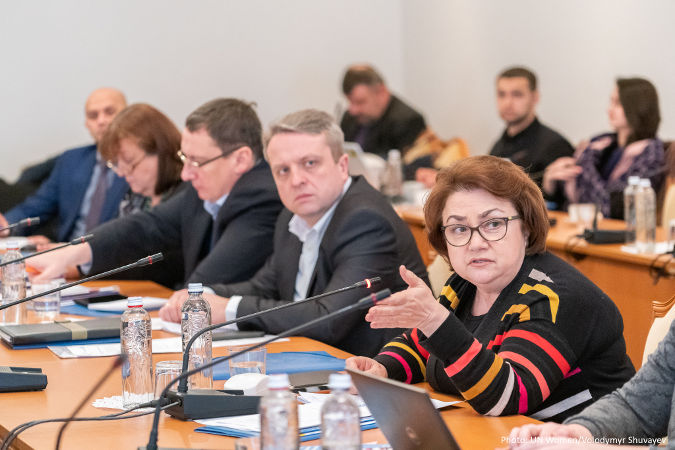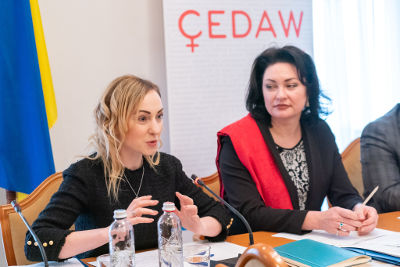Ukraine discusses specific measures to end discrimination against Roma women
Experts discuss issues raised during UN Women’s landmark 2018 conference on Roma women’s rights and look at how to end the discrimination, social marginalisation and poverty Roma women face.Date:

On 13 Feb 2019, UN Women joined in an expert discussion on the progress of the implementation of the Strategy for the Protection and Integration of the Roma National Minority into Ukrainian Society until 2020, (Roma Strategy). Held in Kyiv, Ukraine, the discussion brought together Members of Parliament, representatives of the national and local government, civil society, as well as the international development partners, including UN Women.
The expert meeting built on the efforts and recommendations of the international conference Realizing the Rights of Roma Women in Ukraine, held in October 2018, which detailed discriminatory practices faced by Roma women, Ukraine’s most socially excluded and marginalised group, and examined implementation of state commitments to realize gender equality, equal rights and opportunities for Roma women.
During discussions, attendees echoed calls in the Conference’s Outcome Document for specific measures to ensure post-2020 implementation of Ukraine’s Roma Strategy, which committed the country to ending the discrimination, social marginalisation and poverty faced by its Roma minority.
Besides updating attendees on preparations to evaluate the Roma Strategy, the expert discussion allowed them to take stock of issues preventing its effective implementation across Ukraine.
“A lack of the gender-specific measures in the current Roma Strategy and limited actions at the oblast and community levels requires efforts to address the gaps, as the Government will soon draft the new post-2020 Strategy,” noted Anastasia Divinskaya, UN Women Representative in Ukraine.
Myhailo Padyuk, Deputy Head of the Department of Nationalities and Religion of the Ministry of Culture, which coordinates the Roma Strategy, agreed: “The first Strategy adopted in 2013 was much needed, but it lacked clear targets and indicators. These should be addressed in the new Strategy starting in 2020.”
The estimated 100,000-200,000 Roma women in Ukraine are its most socially excluded and marginalized group. They suffer from triple discrimination: as Roma, as women and as persons belonging to a socially disadvantaged group. They experience greater risks of poverty than men of their community and women from the ethnic majority.
Roma women have higher illiteracy and lower education rates, often in conjunction with early marriage (only 59 per cent attend secondary school). High unemployment rates and poor employment opportunities hinder their full social inclusion and integration. A lack of identification documents prevents Roma women from exercising their social and economic rights.

“We must highlight the key issues that Roma face in Ukraine: harmful stereotypes, lack of identification documents and high unemployment rates,” said MP Iryna Suslova, Head of the Sub-Committee on Gender Equality and Non-Discrimination. “Importantly, gender inequality cuts across these areas of concern.”
Attendees positively noted plans to align the new Roma Strategy with national gender equality documents, such as the newly adopted National Action Plan to Implement CEDAW and the State Social Program on Ensuring Equal Rights and Opportunities, both of which include targets and measures on ensuring gender equality and elimination of discrimination against Roma women.
“In Canada we apply gender-based analysis to assess how diverse groups of women and men may experience policies, programs and initiatives. We’re proud to show full support to the initiatives that help address the rights of Roma women at all levels,” said Rouslan Kats, Counsellor and Head of Foreign Policy and Diplomacy Service Section of the Embassy of Canada in the Ukraine.
The expert discussion was organized by the Sub-Committee on Gender Equality and Non-Discrimination of the Committee of the Verkhovna Rada of Ukraine on Human Rights, National Minorities and International Relations, civil society organization Chiricli and UN Women CEDAW in Action! project funded by Global Affairs Canada.